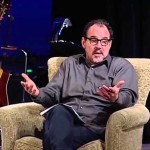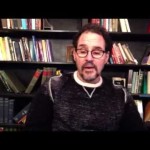We run our website the way we wished the whole internet worked: we provide high quality original content with no ads. We are funded solely by your direct support. Please consider supporting this project.

Listen and Learn: A First Step Toward Reconciliation
Jesus Christ is not just the Lord, Savior and Messiah of the Jews: he is the Lord, Savior and Messiah of all people. Through Christ a kingdom is being established that tears down tribal walls between races and re-unites and reconciles people together in the love God.
Paul makes the point most forcefully. In Ephesians Paul writes that the Gentiles who were once outside the covenant of God “have been brought near by the blood of Christ.” He then continues,
For he himself is our peace, who has made the two [Jew and Gentile] one and has destroyed the barrier, the dividing wall of hostility…His purpose was to create in himself one new humanity out of the two, thus making peace, and in one body to reconcile both of them to God through the cross, by which he put to death their hostility (Eph 2:14-16).
This is a breathtaking teaching! The most fundamental ethnic divide in the ancient world, at least from a Jewish perspective, was the divide between Jews and Gentiles. But by his work on the cross, Paul is saying, Jesus has destroyed the “dividing wall of hostility” between these two groups—and by extension, all other hostile groups. Not only has Jesus brought peace to all previously hostile groups; he himself is the peace between all groups. For through his death Jesus has created “one new humanity.”
A key step in manifesting the “one new humanity” is for those in power to humbly acknowledge that they don’t know what they don’t know. In other words, the only way that whites can understand the systemic racism in our culture is to listen and learn from those who experience it. The only way that people like me can possibly learn about the privilege I experience as opposed to the lack of privilege that people of color experience is to actually listen to them.
So, for example, rather than normalizing our own (privileged) experience and thus denying that racial profiling exists—accusing all who claim otherwise of “playing the race card”—we who are white must humbly listen to and trust the experience of nonwhites whose experience suggest that it does.
We who are white need to cultivate relationships with nonwhites that are deep enough to allow us to “get on the inside” of a nonwhite experience of the world. Not only this, but where it is appropriate, we who are white need to submit to the leadership of nonwhites. Individuals, small groups, and predominately white churches must pursue these submitted relationships if we’re to make headway in manifesting “the one new humanity.”
This is frankly quite challenging for many whites, even for those who sincerely believe they want to be agents of reconciliation. Our privileged status has conditioned us to assume our perspectives are normative and to expect to have things our way. Because America was established by and for whites, nonwhites have to deal with our culture, but we don’t usually have to deal with theirs. The decision to listen, learn, and follow people of color requires whites to place themselves in a submitted position they aren’t accustomed to. But if the systematic racism that has characterized the American church throughout its history is going to be subverted, this is the first step that must be taken.
—Adapted from The Myth of a Christian Religion, pages 113-121
Photo credit: runran via Visualhunt.com / CC BY-SA
Category: General
Tags: Humility, Listening, Love, Racial Reconciliation
Topics: Ethical, Cultural and Political Issues
Related Reading

Sermon Clip: Dear Abby
In this short sermon clip, Greg Boyd discusses Matthew 7. The infamous “plank in your own eye vs a speck of dust in your neighbors. He clarifies what this verse means when you have a close friend with an issue that you are helping them with. In the full sermon of Heart Smart our team…

God Does Not Always Get What He Wants
One of the ways the Bible makes it clear that humans have free will and that God doesn’t predetermine human decisions is found in the responses God has toward human choices. Scripture consistently depicts God as being frustrated by the way his people obstinately resist his plans and Scripture often depicts God’s heart as breaking…

Christus Victor Atonement and Girard’s Scapegoat Theory
Many of the major criticisms of Crucifixion of the Warrior God that have been raised since it was published four weeks ago have come from folks who advocate Rene Girard’s understanding of the atonement. A major place where these matters are being discussed is here, and you are free to join. Now, I have to…

Why Racial Reconciliation Matters
Rachel Held Evans invited Grace Biskie to reflect on racial reconciliation on her blog this week. Grace’s perspective is an important one to hear. Check out Church Stories: A Plea to Engage in Racial Reconciliation. From the article: The problem with disengaging is that it’s not what God intended for us. I believe God expressly…

Living Into the Future
Why didn’t God create a “perfect world”? Here’s Greg’s response to that question. See more at The Work of the People.

Hearing and Responding to God: Part 6
Greg has a couple additional thoughts about this topic so here’s part 6 and we’ll post part 7 tomorrow. Today, Greg discusses a way for us to discern the will of God. You can view the previous videos here, here, here, here, and here. Good stuff!
